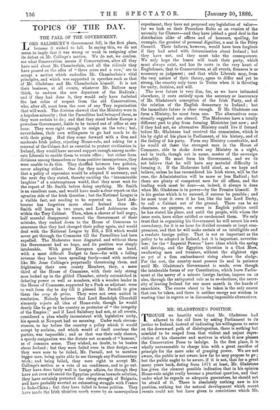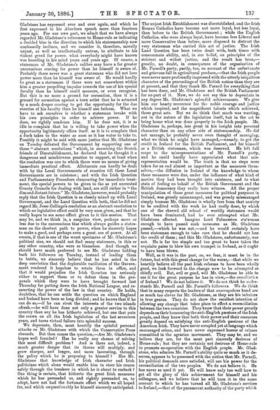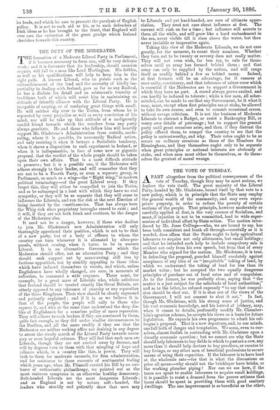MR. GLADSTONE'S POSITION.
THOUGH we heartily wish that Mr. Gladstone had adhered to the old lines by asking Parliament to do justice to Ireland, instead of indicating his willingness to enter on the downward path of disintegration, there is nothing but mischief to be reaped from that violent and unjust depre- ciation of his character and motives in which it now pleases the Conservative Press to indulge. In the first place, it is wholly unreasonable to charge him with a great sacrifice of principle for the mere sake of grasping power. We are not aware, the public is not aware, how far he may propose to go ; but the public ought to be aware. if it is not, that for a great many years back, dating from 1871 at least, Mr. Gladstone has given the clearest possible indication that in his opinion Home-rule might really become a practical question, and that under what he regards as adequate guarantees, he should not be afraid of it. There is absolutely nothing new in his position, nothing but the natural development which recent events could not but have given to convictions which Mr. Gladstone has expressed over and over again, and which he first expressed in his Aberdeen speech more than fourteen years ago. For our own part, we admit that we have always regarded Mr. Gladstone's references to Home-rule as indicating a decided bias in the direction to which his statesmanship now confessedly inclines, and we consider it, therefore, morally unjust, as well as intellectually untrue, to attribute to his violent greed for power, what everybody might have known was brooding in his mind years and years ago. Of course, a statesman of Mr. Gladstone's calibre may have a far greater unconscious craving for power than he himself is aware of. Probably there never was a great statesman who did not love power more than he himself was aware of. He would hardly be great as a statesman if there were not somewhere within him a greater propelling impulse towards the use of his special faculty than he himself could measure, or even recognise. But this is no more a ground for accusation, than it is a ground for accusation against a born artist that he is actuated by a much deeper craving to get the opportunity for the due exercise of his faculty than he himself can fathom. What we have to ask ourselves is whether a statesman breaks with his own principles in order to achieve power. If he does, we rightly condemn him. If he does not, it is as idle to complain that he is willing to take power when the opportunity legitimately offers itself, as it is to complain that a duck takes to the water as soon as it has water to take to. Possibly it might be said with more justice that Mr. Gladstone on Tuesday defeated the Government by supporting one of those "abstract resolutions" which, in answering the Scotch friends of Disestablishment, he declared that he thought it a dangerous and mischievous practice to support, at least when the resolution was one to which there were no means of giving immediate practical effect. Allotments can hardly be dealt with by the Local Governments of counties till these Local Governments are in existence ; and with the Irish Question and Parliamentary Procedure clamouring for immediate treat- ment, the special powers to be given to the as yet uncreated County Councils for dealing with land, are still rather in "the dim and distant future." Mr. Gladstone, however, would probably reply that the Irish Question is so closely mixed up with Local Government, and the Land Question with both, that he did not regard Mr. Jesse Collings's resolution as an abstract resolution to which no legislative effect could be very soon given, and that he really hopes to see some effect given to it this session. That may be, and we think is, a sanguine view, perhaps more or less due to the unconscious bias which always guides a states- man on the shortest path to power, when he sincerely hopes to make a good, and perhaps even a great, use of power. At all events, if that is one of the worst specimens of Mr. Gladstone's political sins, we should not find many statesmen, in this or any other country, who were so blameless. And though we should have much preferred to see Mr. Gladstone holding back his followers on Tuesday, instead of leading them to battle, we sincerely believe that he has acted in the deep conviction that the deplorable vacillation of the Govern- ment rendered it hopeless to retain them in office, and that it would prejudice the Irish Question too seriously either to support them or to defeat them in the pro- posals which they were to have brought forward last Thursday for putting down the Irish National League, and re- asserting the power of the law in that country. He holds, doubtless, that he can settle the question on which England and Ireland have been so long divided ; and he knows that if he can do so,—if he can rivet the interests of the two islands afresh,—he will have done not only a greater service to this country than any he has hitherto achieved, but one that puts the crown on all the Irish legislation of the last seventeen years, and turns virtual failure into splendid success.
We deprecate, then, most heartily the spiteful personal attacks on Mr. Gladstone with which the Conservative Press abounds. But then comes the question,—Are Mr. Gladstone's hopes well founded? Has he really any chance of solving this most difficult problem ? And is there not, indeed, a much greater danger that its thorns will multiply, and grow sharper, and longer, and more lacerating, through the policy which he is proposing to himself ? Has Mr.
Gladstone that knowledge of Irish character and Irish politicians which alone would enable him to steer his course safely through the breakers in which he is about to embark ?
One thing is certain, that hitherto the great Irish measures which he has persuaded us, and rightly persuaded us, to adopt, have not had the fortunate effect which we all hoped for, and which unquestionably he himself sincerely anticipated.
The unjust Irish Establishment was disestablished, and the Irish Roman Catholics have become not more loyal, but less loyal, than before to the British Government ; while the English Catholics, who were always loyal, have become less Liberal and more Conservative than before, more disposed to distrust the very statesman who carried this act of justice. The Irish Land Question has been twice dealt with, both times with consummate ability, and, in our belief, on principles of the strictest and widest justice, and the result has been,— greatly, no doubt, in consequence of the organisation of Mr. Parnell's party, partly, too, on account of the unfortunate and grievous fall in agricultural produce,—that the Irish people were never more profoundly impressed with the utterly iniquitous character of the proceedings of the British nation than they are at present, and that they thank Mr. Parnell for everything that has been done, and Mr. Gladstone and the British Parliament for no part of it. Now, we do not say this to depreciate in any degree Mr. Gladstone's splendid achievements. We give him our hearty reverence for the noble courage and justice which inspired, and the magnificent talents which achieved, those great acts. But we do think that much was wanting, not in the nature of the legislation itself, but in the art to bring home what was done properly to the Irish people. Mr. Gladstone is, perhaps, less great in his insight into personal character than on any other side of statesmanship. He did not manage, he probably never even thought of managing, what we think he might have managed,—namely, to get the credit in Ireland for the British Parliament, and for himself as a British statesman, which was deserved. He left full scope to the misrepresentations of Mr. Parnell's party, and he could hardly have appreciated what that mis- representation would be. The truth is that no steps were taken for an end almost as important as the measures them- selves,—the diffusion in Ireland of the knowledge to whom those measures were due, under the influence of what kind of motive they had been brought into existence, and to what state of feeling on behalf of the British Government and the British democracy they really bore witness. All the proper manipulation of those great measures for political purposes in Ireland, was grossly mismanaged, and was grossly mismanaged simply because Mr. Gladstone is wholly free from that anxiety to be credited with the work he had really done, by which one of the shrewd old school of worldly statesmen would have been dominated, had he ever attempted what Mr. Gladstone effected. Imagine Lord Palmerston statesman enough to have passed such measures as Mr. Gladstone passed,—which he was not,—and he would certainly have been statesman enough to take care that he should not lose the credit of them ; and this Mr. Gladstone, unfortunately, was not. He is far too simple and too great to have taken the requisite pains to blow his own trumpet in Ireland, as it ought to have been blown.
Well, as it was in the past, so, we fear, it must be in the future, but with this great change for the worse,--that while we heartily believe all the past Irish reforms to have been wholly good, we look forward to the change now to be attempted as chiefly evil. But, evil or good, will Mr. Gladstone be able to use it for the great purpose he has in view,--the conciliaticn of Ireland ? We do not believe it. We do not think he under- stands Mr. Parnell and Mr. Parnell's followers. We do think that in many respects the leaders of that unscrupulous band are as much too clever for Mr. Gladstone, as they are his inferiors in true genius. They do not show the smallest intention of allowing any change that takes place to effect a reconciliation between the two countries. They know that their power greatly depends on their humouring the anti-English passions of the Irish people, and they know that both their power and their resources greatly depend on satisfying the anti-English passions of the American Irish. They have never scrupled yet at language which encouraged crime, and have never expressed horror of crimes
committed in the agrarian movement. They may be, and we
believe they are, for the most part sincerely desirous of Home-rule ; but they are certainly not desirous of Home-rule to promote co-operation with the English people. Mr. Glad- stone, who admires Mr. Parnell's ability quite as much as it de- serves, appears to be possessed with the notion that Mr. Parnell, his political demands once satisfied, will use his power for the reconciliation of the two peoples. We do not believe it. He has never so used it yet. He will know only too well how to get all the glory of this achievement for himself and his colleagues, and we believe that he will turn it to the same account to which he has turned all Mr. Gladstone's services to Ireland,—that of the paramount authority of the party which he leads, and which he uses to promote the paralysis of English policy. It is not to such aid as his, or to such defenders of Irish ideas as he has brought to the front, that England will ever owe the extinction of the great grudge which Ireland cherishes towards this country.




































 Previous page
Previous page